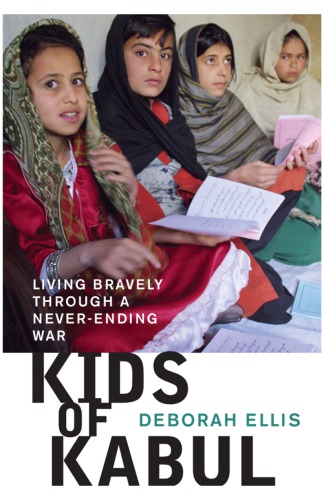
Kids of Kabul
Living Bravely through a Never-ending War
فرمت کتاب
ebook
تاریخ انتشار
2012
Lexile Score
800
Reading Level
3-4
ATOS
5.5
Interest Level
6-12(MG+)
نویسنده
Deborah Ellisناشر
Groundwood Books Ltdشابک
9781554982035
کتاب های مرتبط
- اطلاعات
- نقد و بررسی
- دیدگاه کاربران
نقد و بررسی

June 11, 2012
During a 2011 visit to Kabul, Ellis (the Breadwinner trilogy) recorded the stories of 27 Afghan children, represented in this stirring collection. While some are from prosperous families, others live in desperate circumstances. One 14-year-old is in prison for running away to escape an arranged marriage; an 11-year-old begs in the streets. Unspeakable events are described matter-of-factly ("I don't know why the Taliban killed my family"). Yet the children's hope is undimmed. When they are permitted to study, they excel, and when they are given time and space, they heal: "And look at me now! I am sitting up straight, looking you in the eye and telling my story in a loud, clear voice." They have hope for their country, too: "But if all that can stop, Afghanistan will be great, because there are so many of us who want it to be great." The dichotomy between the speakers' traumatic lives and their essential childlike natures is especially moving: one girl talks about a rocket attack and sharing makeup with her friends in almost the same breath. It's a gritty, poignant, and intensely personal glimpse into the effects of war and poverty. Ages 12âup.

June 1, 2012
Gr 7-10-With characteristic insight, compassion, and journalistic skill, Ellis presents brief interviews, collected during a 2011 visit to Afghanistan, with 25 young people, ages 10 to 17. Each interview is introduced with a photograph and helpful historical and cultural background information that provides context for the reflections. The diverse, candid voices include a land-mine victim, a child bride, orphans, a foreign-exchange student, a daughter imprisoned with her mother, an aspiring artist, a football (soccer) player, a museum worker, and girl and boy scouts. Despite family tragedies, economic deprivation, female oppression, and years of warfare and violence, these young people express remarkable hope for the future and a belief that life will get better. Their determination to get an education and make a positive contribution is inspiring. Readers who possess only a vague knowledge of the distant war and life in Afghanistan will find these stories compelling and motivating. An annotated list of support organizations and Ellis's personal commitment to social justice and peace may spur readers to learn more and become involved. A valuable, informative resource.-Gerry Larson, formerly at Durham School of the Arts, NC
Copyright 2012 Library Journal, LLC Used with permission.

April 1, 2012
The author of the Breadwinner trilogy turns from fictional Afghani children to real ones. The 10- to 17-year-olds interviewed for this collection mostly don't remember the Taliban's fall more than a decade ago, but they can't help but be shaped by the damage the Taliban did to their country. In a country that's been at war for more than 30 years, childhood is very different--or is it? After an over-earnest opening, with teens who have overcome great hardship and want only to succeed in school, this collection diversifies. Parwais has never been to school and wants only to keep his warm, dry job as a museum cleaner. Palwasha, who studies computer science at university, plays for the Afghan Women's National Football Team and aims "to become the best referee in Afghanistan." Fareeba doesn't speak for herself; the mental-hospital inmate has a cognitive disability and no access to the medical or educational opportunities that might help her find language. Angela, meanwhile, attends American University in Kabul and hopes to attend Brown. One girl is imprisoned for fleeing a forced child marriage, while another's mother is a member of Parliament; one boy's damaged by a landmine, and another's proud to be a Scout. The most cutting words are those of 14-year-old Shabona: "Do you have war in Canada? Maybe it is your turn, then." Clear introductions to each young person provide historical, legal and social context. This nuanced portrayal of adolescence in a struggling nation refrains, refreshingly, from wallowing in tragedy tourism and overwrought handwringing. Necessary. (Nonfiction. 10-14)
COPYRIGHT(2012) Kirkus Reviews, ALL RIGHTS RESERVED.

May 15, 2012
Grades 8-11 The 27 young people, ages 1017, whom Ellis interviewed in Kabul and quotes in this volume, will grab readers' hearts with the bravery of their hope ( Even in the ugly parts of Kabul, flowers bloom ); their ability to imagine better times; and their excitement in learning. Ellis, however, also clearly presents their brutal reality of daily life in a world ravaged by war. Designed for much older readers than Jeanette Winter's Nasreen's Secret School (2009), this title will pair well with Ellis' Breadwinner novels. Because it is not fiction, though, the book will reach a different group of readers, in a different way. These speakers are not characters, functioning in a plot, but teens' actual contemporaries, whose voices linger long after the reading. Many Western kids will have trouble forgetting 14-year-old Sharifa's calm insistence on what is most important: I try to remember that my house is not me. Where we live, it is very, very bad. A powerful discussion starter on both current events and timeless issues of self-definition.(Reprinted with permission of Booklist, copyright 2012, American Library Association.)

























دیدگاه کاربران